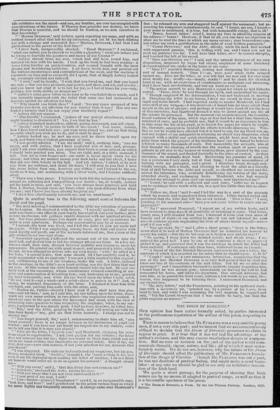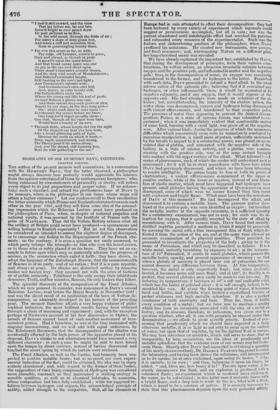THE DOOM OF DERENZIE.*
OUR opinion has been rather formally asked, by parties interested in the posthumous reputation of the author of this poem, respecting its merits.
There is reason to believe that Mr. FURLONG was a very amiable young man, if not a very able poet ; and we lament that we are conscientiously obliged to declare that the Doom of Derenzie possesses no claim to appear in print. It is true that it has not had the advantage of the author's revision, and this may excuse numberless defects of composi- tion. But no care or revision on the part of the author could com- municate thought, vigour, nature, and life ; all of which it most unfor- tunately wants. We do not see, however, why the failure of the Doom of Derenzie should affect the publication of Mr. FURLONGS transla- tion of the Songs of Carolan. Though Mr. FURLONG was not a poet, he was not destitute of poetical feeling, ahd might make a good trans- lator : at any rate we should be glad to see only an indifferent transla- tion of the Irish bard.
We quote a short passage, for the purpose of showing that Irish names are by no means ill adapted to poetical usage, as well as that it is a favourable specimen of the poem.
* The Doom of Derenzie, a Poem. By the late Thomas Furlong. London, 1829. Robins.
"I look'd still onward, and the view That lay before me, far and fait, Seem'd bright as ever pencil drew Or poet pictured as he flew, In his wild mood, through the fields of air ; For many a slope.of deep green hue, And many a cliff and mountain blue; Rose in commingling beauty there.
"Far o'er this scene so far, so wide, Thy ridge, old Leinster, seemed to grow, Dark and abrupt, as though in pride it scowl'd upon the space below : And that broad sunny space was one As gay as the eye ever dropt upon.
There stood Cranruah's summit brown, And the deep wild woods of Marshalstown ; And Ballyorl's extended height, Still basking in the sun's last light ; And Tomahurra's uplands wide ; And Coolnahorna's corn-clad hill, And, nearer, in calm beauty still, Old Ballinhallin's rocky side, Where the young oak lifts his leaf of pride.
Around Raheen a glance was cast, And there spread deep each grove or glen,
Traced by our steps, in the days long past—
Oh ! might such days be ours again !— But through the scenes before me there, One long-lov'd object proudly shone ; One that, though all the vales were bare, Would hold a beauty of its own.
" Through fields, whose length did tire the sight Of the strained eye that o'er him bent, Like a broad glittering path of light,
Blessing the earth on which it went,—
Deep, rapid, unrestrain'd, and strong, The Slancy pour'd its waves along;
And, o'er the strand, still foaming free,
Bore its wide gathering to the sea."



















 Previous page
Previous page